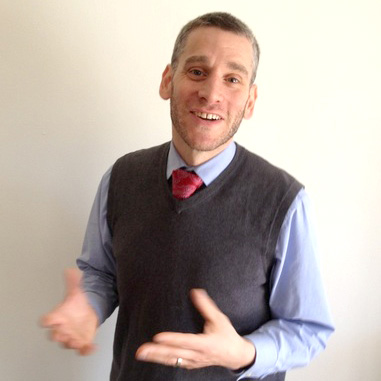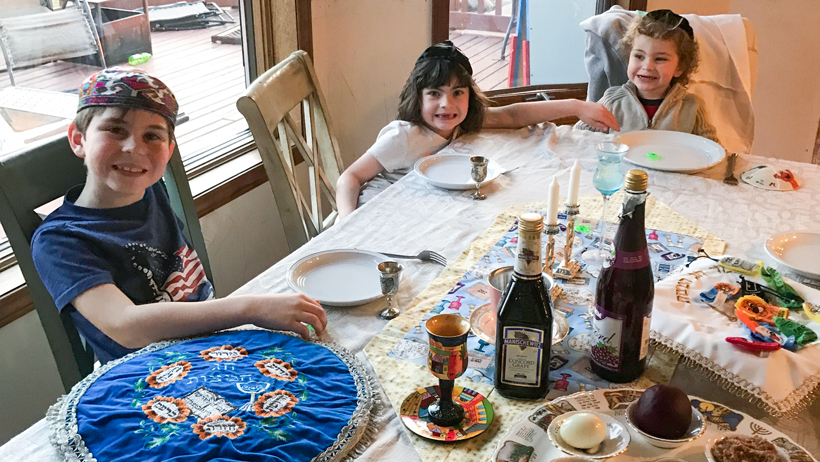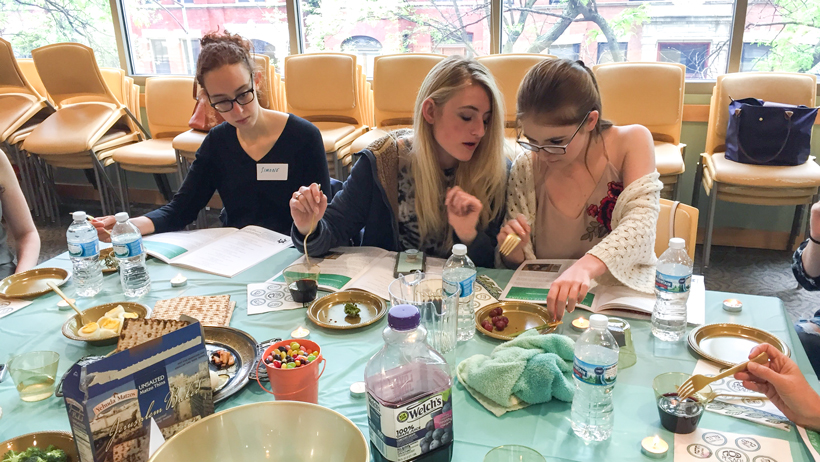It is definitely unusual to be writing about challah for a series about Passover, but the connection is not as far off as you might think.
Challah-baking is a special ritual to me -- it brought my family together. On a Friday afternoon several years ago, my then-girlfriend found a recipe and surprised me by making and baking challah from scratch. That was the day I knew I would marry her -- it was a statement that while she was not Jewish, she was willing to engage with me as a partner in building a Jewish home.
Many years and two kids later, challah is beginning to play a new role in my life. About a year ago, I was invited to serve on the Board of Directors of Challah for Hunger . Those familiar with Challah for Hunger will know of its longstanding model of empowering college communities to bake and sell challah to raise money and awareness around hunger while acting to end food insecurity.
During the week of Passover, Challah for Hunger chapters will hang up their aprons and pause their work. As a result, the battle against hunger will lose an estimated $8,756.16 in donations from challah sales.
So yes, Passover has nothing to do with challah, but it has everything to do with food justice.
Most Passover Seders begin with the invitation to "let all who are hungry come and eat." It is for this reason that when Jews rid their pantries of that sweet, delicious bread they crave most during the holidays, they should turn their attention to those who struggle to find enough bread to sustain themselves day to day.
And believe it or not, many of those who struggle are college students. According to a recent report from the Hope Center at Temple University, 40 percent of students at four-year colleges are experiencing some form of food insecurity. At community colleges, that number is 50 percent. It hardly seems possible that universities, especially top-tier schools where plenty of middle- and upper middle- class families send their children, would see large numbers of students worrying about where their next meal might come from. However, with 3 million college students facing hunger in America, the challenges of campus hunger can be found almost everywhere.
Just like Jews search for the afikomen because the seder cannot finish until it is found, millions of college students will struggle to finish their college educations until solutions to campus hunger are found. That's why activists, supported by Challah for Hunger's Campus Hunger Project, are stepping up to raise awareness and advocate for solutions. A recent article in JTA highlighted the stories of students at schools like Vanderbilt and University of Michigan who are "sounding the alarm for college students who can't afford food."
For a variety of reasons, including social pressures and structural challenges, campus hunger also remains a hidden problem. A recent op-ed by Lauren Ross, a University of Wisconsin student, explained that her school has limited resources to support students experiencing hunger, resources that are not widely known given the assumption that students don't need to use them. Ross herself admits that she was completely unaware until she got involved with Challah for Hunger and MAZON: A Jewish Response to Hunger.
Wisconsin is not the only place where the Campus Hunger Project is educating communities about the issue and inspiring them to take action. Take the case of Muhlenberg College , for example, where Challah for Hunger students are working with Hillel to organize monthly educational and community events. The first event involved volunteering with the local food bank.
Since its founding, Challah for Hunger has not only grown the number of chapters but the ability to influence where it matters most. The release of the Hope Center report, in conjunction with the Government Accountability Office, marked the first time that the Federal government took notice of the issue, and Challah for Hunger was among the organizations in the room working to elevate awareness. It is inspiring to see that some universal issues, such as hunger, can be a beacon for bipartisan policy in an otherwise stormy sea of divisiveness.
Challah for Hunger is also working to expand beyond college campuses, which, in addition to my passions for social justice, coaching and challah, is why I got more involved. The goal of this expansion is to broaden Challah for Hunger's advocacy reach by working with families in Jewish communities across the U.S. In short, young families get a simple and impactful entry point to engage in Jewish community while simultaneously boosting the challah sales that support advocacy work and help end food insecurity.
With a halt in the challah-baking operation this week, Challah for Hunger is focusing on raising a different kind of dough. In addition to asking for donations, they're asking families and Jewish communities to consider including discussions around the problem of campus hunger when they come together during the holiday. This resource highlights a few points during the Seder where this important topic can be brought to light.
In order to tackle this issue, there must first be awareness of it. May we help build a community inspired and educated to take action against hunger.
Read more stories in the "Why We Retell the Story" Passover blog series at oychicago.com/Passover .





.jpg)





.jpg)



